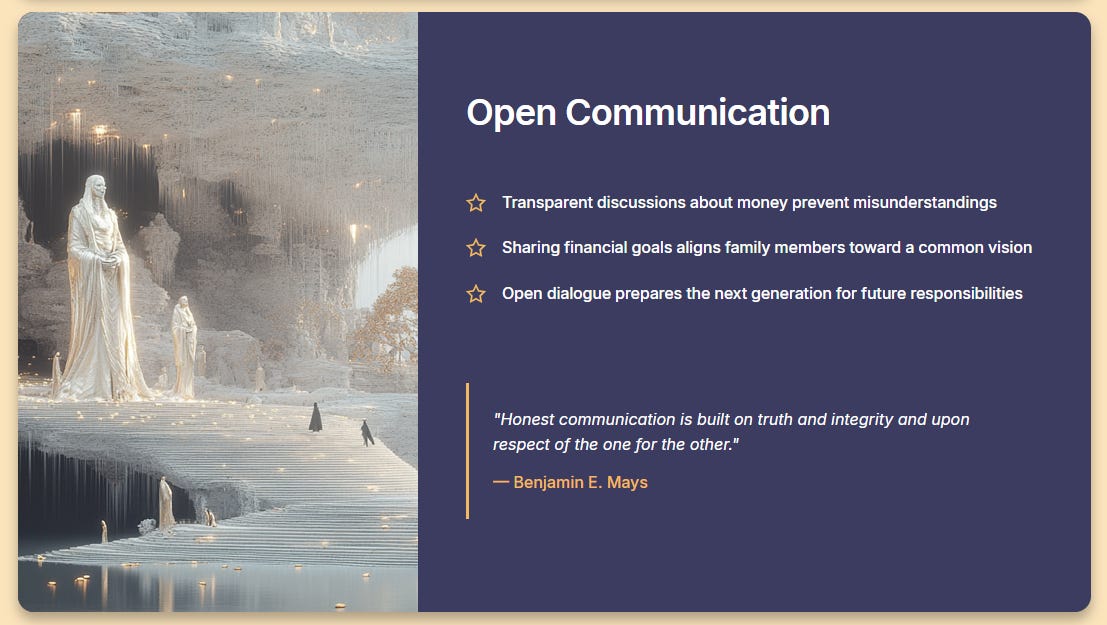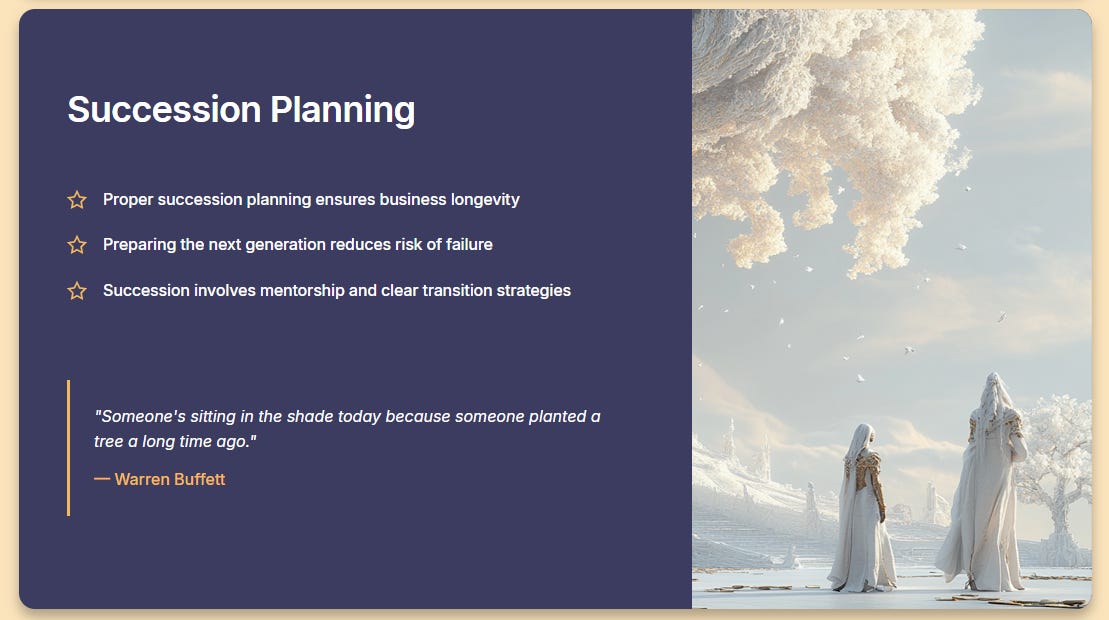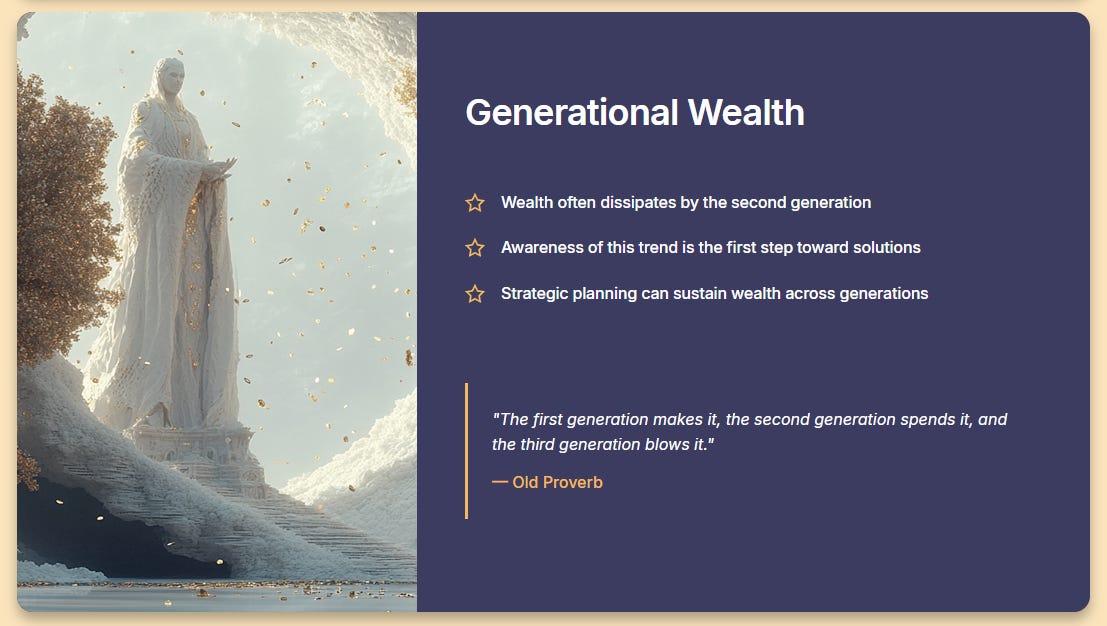Warren Buffett's Wisdom - Broke Parents Rich Kids - The Shocking Truth About Why 70% of Rich Families Go Broke!
🤯💸 Millionaire Parents = Broke Children? The REAL Reason Rich Kids Fail (And How to Break the Curse)
Imagine spending your life building a fortune, only to watch it disappear within a generation. It's a harsh reality that's more common than you might think. In the quest to create generational wealth, many overlook a critical factor: ensuring that wealth endures beyond their lifetime.
Renowned investor Warren Buffett has pondered this very dilemma, emphasizing the importance of passing on not just wealth, but also wisdom and values. He advocates for providing his children with enough resources to pursue their ambitions, but not so much that they become complacent. Buffett's approach highlights a crucial balance in wealth transfer—one that fosters independence and responsibility in the next generation.
Buffett's reflections highlights a critical issue that many affluent families confront: the challenge of preserving wealth across generations without sacrificing family harmony or individual ambition. His approach, prioritizing open communication, setting clear expectations, and fostering philanthropic engagement among his heirs, serves as a blueprint for mitigating the risks of wealth dissipation and family discord.
You can find the letter below:
The unsettling phenomenon where 70% of wealthy families lose their wealth by the second generation and 70% of family-owned businesses fail or are sold before reaching the same milestone underline the urgency of addressing the issue early.
I'll explore the root causes of this great intergenerational wealth loss, examine its impact on younger generations, especially Gen Z and, most importantly, outline strategies to prevent this fate for your family. Whether you're investing in stocks and ETFs, strategizing to reduce taxes legally, or building a business empire, understanding these dynamics is crucial to safeguarding your legacy.
ICY Don’t Know!
Become a Premium Member Before BUY/SELL Signal Alerts Launch. Once launched Only New Lifetime Members will have access to signals and a significant price increase! Not a member yet? Upgrade your game. All MOATs Of Midas Touch portfolios and Telegram Alerts!
The Generational Wealth Problem
A stark reality faces wealthy families today: 70% of rich families lose their wealth by the second generation, and 70% of family-owned businesses fail or are sold before reaching the second generation. This phenomenon isn't just a series of isolated incidents—it's a pervasive issue known as the "great intergenerational wealth loss."
This trend represents a significant erosion of wealth that hardworking individuals have spent their lives accumulating. It's a disheartening scenario where the efforts of one generation fail to benefit the next, leading to a cycle where each generation must start anew. This isn't just about money; it's about the loss of opportunity, security, and the ability to build upon prior successes.
The "great intergenerational theft," as some call it, is creating significant tension between generations. The expectations of inheritance and financial security are clashing with the realities of wealth dissipation, leading to frustration and resentment. Understanding why this happens is the first step toward breaking the cycle.
Root Causes of Family Financial Conflict
Communication Barriers
At the heart of many family financial failures lies a fundamental issue: a lack of open financial dialogue within families. Money remains a taboo topic in many households, cloaked in secrecy and avoidance.
Hidden Wealth or Struggles: Parents may hide their true financial status—whether wealth or debt—from their children, leaving them uninformed and unprepared.
Avoidance of Money Talks: Discomfort with discussing finances leads to a communication gap, resulting in children lacking essential financial knowledge and skills.
Inherited Misunderstandings: Without clear conversations, misconceptions and unrealistic expectations about wealth can fester.
This silence creates problems later, as children are thrust into managing wealth (or debt) without guidance, leading to mismanagement and conflict.
Traditional Planning Pitfalls
Another significant issue is the conventional approach to retirement and wealth building, which often overemphasizes future rewards at the expense of present fulfillment.
This approach creates a cycle where people:
Work Jobs They Don't Enjoy: Enduring unfulfilling careers solely for financial security.
Save Excessively Out of Guilt: Hoarding wealth while fearing spending any of it.
Postpone Life Experiences: Delaying gratification and missing out on meaningful life events.
Pass on Similar Pressures to Their Children: Imposing the same restrictive financial habits on the next generation.
Such a focus on delayed gratification can lead to resentment and a lack of appreciation for the value of money, as children may rebel against these constraints once they're in control.
Generational Wealth Loss
The statistics are staggering:
70% of wealthy families lose their wealth by the second generation.
70% of family-owned businesses fail or are sold before reaching the second generation.
This cycle of wealth loss isn't due to a single factor but a combination of mismanagement, lack of preparation, and failure to instill financial responsibility in heirs.
Wealth Without Wisdom: Inheritors may lack the financial education required to manage substantial assets effectively.
Entitlement and Complacency: Growing up in affluence can breed a sense of entitlement and diminish the drive to maintain or grow wealth.
Poor Business Succession Planning: Without clear plans, family businesses falter due to leadership voids or internal conflicts.
The result is a dissipation of wealth that not only diminishes the family's financial standing but also erodes the foundation for future generations to build upon.
Gen Z Financial Crisis
The wealth loss isn't just a problem for the wealthy—it's symptomatic of broader financial challenges facing younger generations, especially Generation Z.
Economic Skepticism: Only 37% of Gen Z believes most Americans have economic opportunities. This lack of confidence reflects a broader disillusionment with the traditional pathways to financial success.
Precarious Employment: Many are working multiple jobs or in gig economy positions that lack stability and benefits.
Housing and Retirement Pessimism: A majority are doubtful about ever being able to buy homes or retire comfortably.
These challenges are compounded by the burdens of student debt, high living costs, and economic uncertainties. The financial crisis facing Gen Z isn't just about personal finances; it's a systemic issue that affects their outlook on wealth and the future.
Mental Health Impact
The financial strains aren't just hitting wallets—they're impacting mental health significantly.
Declining Mental Health: 57% of young people reported declining mental health, with financial stress being a major contributor.
Housing Insecurity: 76% don't believe they'll ever afford housing, leading to anxiety and feelings of instability.
Lack of Savings: The average young person has less than $2,000 in savings, leaving them vulnerable to unexpected expenses and emergencies.
This psychological burden affects productivity, relationships, and overall quality of life. The stress of financial insecurity can lead to a cycle of negative outcomes, further hindering the ability to build wealth.
Viral Solutions Presented
Amidst these challenges, several strategies have emerged to combat the intergenerational wealth loss and financial struggles of younger generations.
Communication Strategy
Stop Avoiding Money Talks: Families need to break the silence around money. Open dialogues about finances can demystify wealth and prepare the next generation for responsibility.
Create Open Dialogue About Wealth and Inheritance: Discussing inheritance plans, financial goals, and the realities of managing money helps set clear expectations and reduces misunderstandings.
Foster Financial Transparency: Sharing the family's financial situation—both successes and challenges—builds trust and educates family members.
Practical Approach
Implement Matching Strategies for Young Savers: Parents can encourage saving by matching their children's contributions, teaching the value of saving and investing.
Establish Automated Savings Systems: Automation reduces the chance of neglecting savings and promotes consistent financial growth.
Focus on Financial Education Before Inheritance: Equipping heirs with financial knowledge ensures they're prepared to manage wealth effectively when the time comes.
These solutions emphasize proactive engagement and education, shifting the focus from withholding information to empowering the next generation.
Prevention Strategies
Preventing wealth dissipation and financial conflict requires deliberate actions that promote understanding, responsibility, and balance.
Early Financial Education
Start Financial Discussions Early: Introduce money concepts before children leave home to build a strong foundation.
Teach Basic Money Management Skills: Budgeting, saving, and responsible spending should be taught during formative years.
Introduce Credit Responsibility: Educate teenagers about credit scores, debt management, and the long-term impact of financial decisions.
Early education demystifies money and instills habits that lead to financial independence and responsibility.
Open Communication
Regular Family Discussions About Money Matters: Scheduled conversations can normalize financial topics and keep everyone informed.
Transparency About Wealth: Being open about the family's financial status prevents misconceptions and unrealistic expectations.
Discuss Inheritance Plans: Clear communication about wealth transfer reduces surprises and potential conflicts.
Open communication fosters trust and aligns family members toward common financial goals.
Balanced Approach to Wealth
Prioritize Experiences and Memories: Wealth should enhance life, not hinder it. Emphasize the importance of enjoying life presently.
Balance Current Enjoyment with Future Security: Encourage a lifestyle that allows for present pleasures without sacrificing future stability.
Consider the Emotional Aspects of Wealth Transfer: Recognize that inheritance isn't just a financial transaction but an emotional one that can affect family dynamics.
A balanced approach prevents the resentment that can arise from overly restrictive financial practices or, conversely, unchecked spending.
Implementation Steps
Turning these strategies into action requires a structured plan and, often, professional assistance.
Create a Structured Plan
Establish Clear Communication Channels: Decide on the best ways for your family to discuss financial matters, whether through regular meetings or open-door policies.
Set Up Automated Savings Systems: Utilize financial tools and apps to automate savings and investments for all family members.
Build Emergency Funds: Ensure that everyone has a safety net to reduce stress and prevent financial crises.
Develop Clear Inheritance Guidelines: Document plans for wealth transfer, including contingencies and conditions, to eliminate ambiguity.
Having a clear plan ensures that everyone knows their role and expectations, reducing the potential for conflict.
Professional Guidance
Engaging experts can provide objectivity and expertise that might be lacking within the family.
Financial Advisors: Professionals can help create fair distribution plans, investment strategies, and financial education programs tailored to your family's needs.
Estate Planning Attorneys: Legal experts ensure proper documentation, compliance with laws, and can help navigate complex inheritance issues.
Family Therapists or Mediators: In cases where communication is strained, professionals can facilitate productive discussions.
Professional guidance helps avoid common pitfalls and maintains family harmony by providing neutral perspectives.
Take This Home
The key to preventing generational financial conflict and wealth loss lies in early planning, open communication, and finding the right balance between current enjoyment and future security. By addressing communication barriers and traditional planning pitfalls, families can create a sustainable approach to wealth that benefits all generations.
Empower the Next Generation: Equip your children with the knowledge and tools they need to manage wealth responsibly.
Promote Transparency and Trust: Open dialogues about money foster mutual understanding and align family goals.
Balance Life and Wealth: Use wealth as a tool to enhance life, not a burden that diminishes it.
Breaking the cycle of wealth dissipation isn't just about preserving money; it's about enriching lives and ensuring that the hard work of one generation becomes the foundation for the next. By implementing these strategies, you can help your family avoid becoming another statistic and instead build a lasting legacy of prosperity and fulfillment.
Did you find this article valuable? Join our community of savvy investors and wealth builders by subscribing. Stay informed with insights on investing, generational wealth, tax strategies, and more. Let's secure your financial legacy together.
Remember what goes up must come down (eventually)
Stay safe and invest wisely and this is in no mean financial advice. [Full Disclaimer]Thank you for supporting this newsletter. It will keep improving.
Harry
















That 70% failure rate in family businesses mirrors what I see analyzing corporate succession plans - too much focus on preserving assets, not enough on developing leadership. This same pattern shows up in public companies where founders often struggle with transition planning, which is why I always scrutinize succession strategy in my stock analysis.